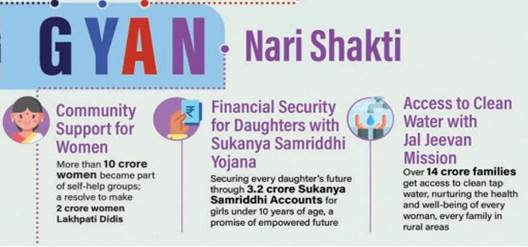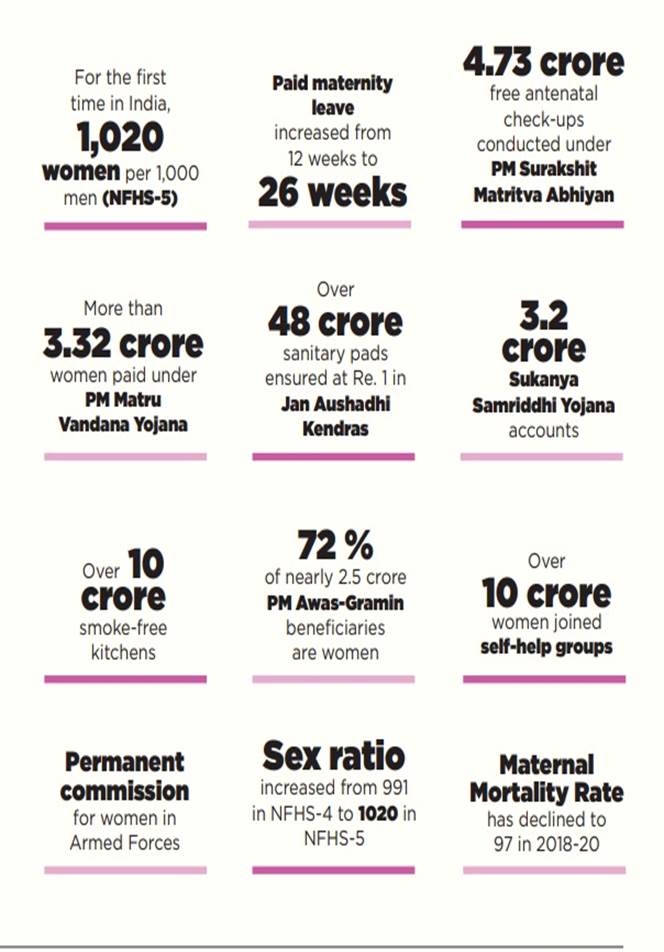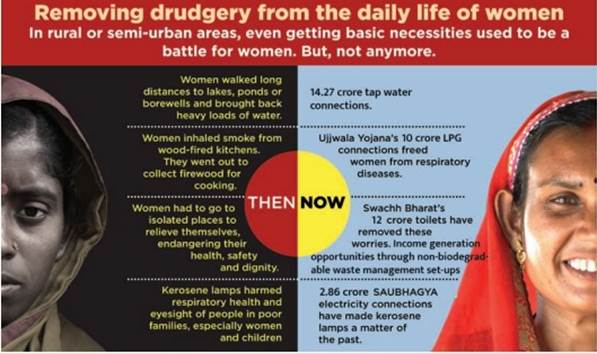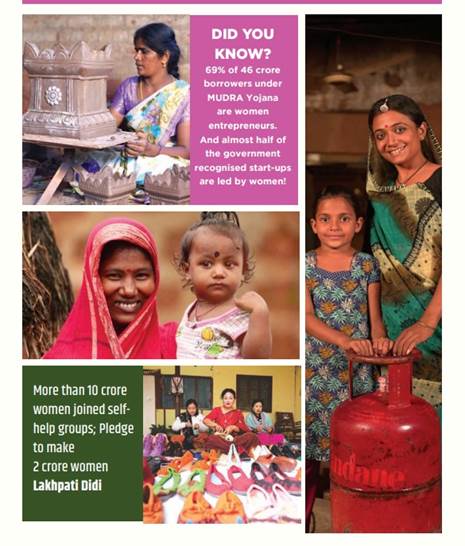Others
NARI SHAKTI: From Women Development to Women led Development
Posted On: 06 MAR 2024 4:58PM
From Women Development to Women led Development
March 6, 2024
India's development journey is closely interlinked with the empowerment of its women. Recognizing this critical connection, the central government has placed Nari Shakti at the forefront of its agenda over the past nine years. The government understands that women's empowerment is not a one-time solution; it requires a comprehensive approach that addresses their needs throughout their lives. In this regard, welfare programs have been designed to support women at different stages, enabling them to overcome socio-economic barriers and achieve wholesome empowerment.
- Nari Shakti Adhiniyam passed giving 33% reservation to women
- National Sex Ratio improved to 1020 for the first time
- Paid maternity leave increased to 26 weeks
- Over 4.73 Crore pregnant women examined under PM Surakshit Matritva Abhiyan
- 3.2 Crore Sukanya Samruddhi Yojana accounts
- Around 10 crore smoke-free kitchens by providing LPG Gas cylinders
- 72% women ownership under PM Awas Yojana Gramin
- MMR to 97/lakh live births in 2018-20 from 130/lakh live births in 2014-16
- Abolition of Triple Talaq empowering Muslim women
- 69% of the loans have been sanctioned to women entrepreneurs under PMMY and 84% of the beneficiaries under Stand-Up India are women.
- Permanent commission granted to Women Officers in 12 Arms and Services.
- Entry of women as Agniveers commenced in all the three Services
- 43% STEM graduates in India are women which is highest in the world


Nari Shakti Adhiniyam – Amrit Peedi’s Moment
A milestone in this journey has been achieved by the passing of the Nari Shakti Vandan Adhiniyam, 2023) which seeks to reserve one-third of the total number of seats for women in Lok Sabha, State Legislative Assemblies and Delhi Assembly.
Another notable feature was that the Women’s Reservation Bill, called was the first to be considered in the new parliament building setting the tone for India’s Amrit Kaal.
Beti Bachao, Beti Padhao – A step towards gender empowerment
One of the key initiatives is the Beti Bachao Beti Padhao (BBBP) scheme, which has generated significant mass mobilization to combat gender discrimination and promote the value of the girl child. At every level, the scheme has worked diligently to raise awareness about the rights of girl children through community engagement. By advocating against sex selection at birth and encouraging positive action to support their educational growth, BBBP has brought about a positive change. Over the years, there has been a commendable improvement in the sex ratio at birth, with a rise of 19 points from 918 (2014-15) to 937 (2020-21). Additionally, the enrolment of girls in secondary education has increased from 75.51% in 2014-15 to 79.46% in 2020-21, marking significant progress. Further, for the first time in the country, the Sex Ratio of the total population (females per 1000 males) has reached 1020 (NFHS-5, 2019-21).
Celebrating motherhood
In the pursuit of a malnutrition-free India, the government launched the POSHAN Abhiyaan on March 8, 2018. This mission is a convergence platform for various stakeholders to address malnutrition comprehensively. With the aid of the POSHAN Tracker, a robust ICT-enabled platform, real-time monitoring of supplementary nutrition and prompt supervision and management of services are ensured. The engagement of over 14 lakh Anganwadis and the coverage of approximately 10 crore beneficiaries exemplify the scale of impact achieved through this initiative.
The paid maternity leave has been extended from 12 weeks to 26 weeks. The amendment to the Maternity Benefit Act, 1961 was passed by the Indian government to provide better support and protection for working mothers. This significant policy change recognizes the importance of allowing new mothers sufficient time to recover from childbirth, bond with their infants, and ensure their overall well-being.
Dignity of livelihood

PM Awas Yojana - Gramin
Recognizing the importance of secure housing and financial decision-making for women, the government introduced the Pradhan Mantri Awas Yojana - Grameen (PMAY-G). Impressively, more than 72% of these houses are either solely or jointly owned by women. By granting ownership of houses to women, PMAY-G has fulfilled their aspirations and empowered them to actively participate in household decision-making.
PM Ujjwala Yojana
To address the health and safety concerns of women, the Pradhan Mantri Ujjwala Yojana (PMUY) was launched in May 2016. This initiative aims to provide clean cooking fuel, (LPG), to rural and underprivileged households. The distribution of over 10 crores LPG connections under PMUY has safeguarded the health of millions of women, freeing them from the hazards of using traditional biomass fuels like firewood, dried cow dung, etc, as cooking fuels and the consequent indoor air pollution.
Swaccha Bharat Mission
Another critical aspect of women's empowerment is access to sanitation. Realizing the challenges faced by women due to inadequate sanitation facilities, Prime Minister Narendra Modi launched the Swachh Bharat Mission (SBM) on October 2, 2014. This mission aimed to provide toilets to all households in the country, thus ensuring improved sanitation and hygiene. And on 2nd October 2019, 11 years ahead of the SDG-6 target set by the United Nations, rural India became open defecation-free (ODF). As per the report titled “Access to toilets and the safety, convenience and self-respect of women in rural India”, after the construction of toilets, 93% of women said they were no longer afraid of being harmed by animals while defecating, contracting health infections and going to the toilet in the dark of night. The availability and regular usage of sanitation facilities have greatly contributed in ensuring the well-being and dignity of women, marking a significant achievement in India's journey towards a cleaner and healthier nation.
Jal Jeevan Mission
Access to clean drinking water is vital for the well-being of communities, particularly women. With this understanding, the government launched the Jal Jeevan Mission (JJM) on August 15, 2019. With primary objective to provide clean tap water to every rural household and public institution, tap water connection has been provided to 14.45 crore households under the mission. By ensuring the availability of safe drinking water, the mission aims to alleviate the burdens faced by women in fetching water over long distances. This transformative initiative has empowered women and contributed to the enlightenment of villages with regard to water, sanitation, and hygiene practices.
Financial Empowerment
Women's empowerment is contingent upon the economic empowerment of women. That is why the government has taken steps to promote financial inclusion among women through initiatives like Stand-Up India and Pradhan Mantri Mudra Yojana. Stand-Up India scheme focuses on providing support for the establishment of greenfield enterprises among women, Scheduled Castes (SC), and Scheduled Tribes (ST). Similarly, PMMY aims to provide financial assistance to non-corporate, non-farm micro and small enterprises. Around 69% of the loans have been sanctioned to women entrepreneurs under PMMY and 84% of the beneficiaries under Stand-Up India are women. Mahila Samman Savings Certificate was introduced as part of the Union Budget 2023-24, which is a small savings scheme exclusively for female investors. These initiatives have enabled women to chart their paths and contribute to the economic growth of the nation.

Safety and Security
Mission Shakti is another noteworthy endeavour by the government, seeking to enhance women's safety, empowerment, and participation in the workforce. This mission aims to address gender biases, discrimination, and the care burden on women through skill development, capacity building, financial literacy, and access to micro-credit. Integrated services provided under one roof, such as police, medical and legal aid, counselling, and psycho-social support through One-Stop Centres (OSCs), ensure comprehensive assistance for women affected by violence. A toll-free women's helpline (181) further offers emergency and non-emergency support. Mission Shakti has created an enabling environment for women to thrive and actively contribute to society.
Abolition of Triple Talaq
The Muslim Women (Protection of Rights on Marriage) Act, 2019 was enforced in India on September 19, 2018. This Act renders the practice of instant divorce, commonly known as triple talaq, void and illegal when pronounced three times. It imposes penalties, including imprisonment for up to three years and a fine, on husbands who engage in the practice of instant triple talaq. By implementing the triple talaq law, the Indian government aimed to provide legal protection to Muslim women who had been subjected to this regressive practice for many decades. This significant reform has led to an improvement in the overall situation of Muslim women, enabling them to escape domestic violence and discrimination they previously endured within society.
From Women development to Women-led development
Over ten years, the government's efforts have led to remarkable progress in women's empowerment. The number of female police personnel has increased significantly, and women athletes have brought laurels to the country with their remarkable achievements. Enrolment of women in the fields of Science, Technology, Engineering, and Mathematics (STEM) has also witnessed significant growth.
By shifting the narrative from women as recipients of welfare to agents of empowerment, the government has been successful in hugely transforming Indian women’s lives. From addressing gender discrimination to promoting education, health, housing, entrepreneurship, and safety, these initiatives have brought about tangible improvements in the lives of women and contributed to the nation's overall progress. Today, it is not just about women's development but women-led development.
Nimish Rustagi/Himanshu Pathak/Ritu Kataria/Priyanka Kumari
NARI SHAKTI: From Women Development to Women led Development
(Backgrounder ID: 151861)
Visitor Counter : 38172